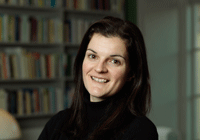
Elise Dermineur
Pro Futura Scientia Fellow, SCAS.
Associate Professor of Economic History, Stockholm University
After studying history at the Université de Strasbourg, Elise Dermineur received a Ph.D. in History in
2011 from Purdue University for the thesis ‘Women in Rural Society: Peasants, Patriarchy and the
Local Economy in Northeast France, 1650–1789’. In 2011, Dermineur was a Max Weber Fellow at
the European University Institute, Florence. Between 2011 and 2013, she held a postdoctoral fellowship
at Umeå University. From 2013 to 2015, she worked as a Research Fellow at Lund University on the
project ‘Marrying Cultures: Queens Consort and European Identities, 1500–1800’, funded by the
Humanities
in the European Research Area (HERA). In 2016, she was promoted to Associate Professor.
She spent the
academic year 2018-2019 at the Center for Advanced Study in the Behavioral Sciences at
Stanford University.
In 2021-2022, she is a visiting fellow at the Robert Schuman Centre for Advanced
Studies at the European University Institute. Since 2019, she is directing the research initiative Human
Economy Lab.
Her research interests range widely, from the history of justice and economics to gender and women’s
history. Above all, she is deeply interested in the study of traditional communities. Dermineur’s publica-
tions
include articles published in the Journal of Social History, The Journal of Interdisciplinary History,
Financial History Review and Social Science History, among others. In 2017, she published Gender and
Politics in Eighteenth-Century Sweden, a political biography of the Swedish queen Lovisa Ulrika (1720–
1782).
In 2018, she published a collection of essays titled Women and Credit in Preindustrial Europe and
she co-editedRevisiting Gender in European History, 1400-1800.
As a Pro Futura Scientia Fellow, she is currently revising a book manuscript tentatively titled Banking
Before
Banks, dealing with early financial markets. She is also revisiting the concept of the moral economy
in modern
societies.
This information is accurate as of the academic year 2021-22.






